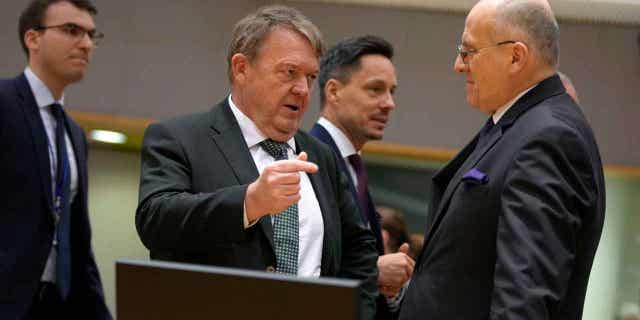

Myanmar languished under strict military rule for five decades. That led to international isolation and sanctions. As the generals loosened their grip, and Aung San Suu Kyi became leader in 2015 elections, the international community eased most of the sanctions and poured investment into the country.
THOUSANDS FLEE BURMA AIRSTRIKES, COMPLICATING CRISIS

Denmark's Foreign Minister Lars Lokke Rasmussen, center, speaks with Poland's Foreign Minister Zbigniew Rau, right, in Brussels on Feb. 20, 2023. European Union foreign ministers imposed sanctions on nine Burma officials linked to rising violence and human rights violations. (AP Photo/Virginia Mayo)
That ended with a military coup on Feb. 1, 2021. It was launched after the military rejected the results of November 2020 elections, which were won overwhelmingly by Suu Kyi’s National League for Democracy party.
BURMA FORCES KILL DOZENS IN DEADLIEST DAY SINCE COUP
The takeover was met with massive public opposition, which has since turned into armed resistance and what some United Nations experts have called a civil war.
According to the military and media reports last week, the military government plans to allow people who are "loyal to the nation," including government employees and retired military personnel, to carry licensed firearms.
The new sanctions, endorsed by EU foreign ministers, mean that a total of 93 people and 18 agencies, companies or organizations have now been targeted. The bloc also has an arms embargo in place, as well as a ban on equipment that can be used for internal repression or for monitoring communications.
